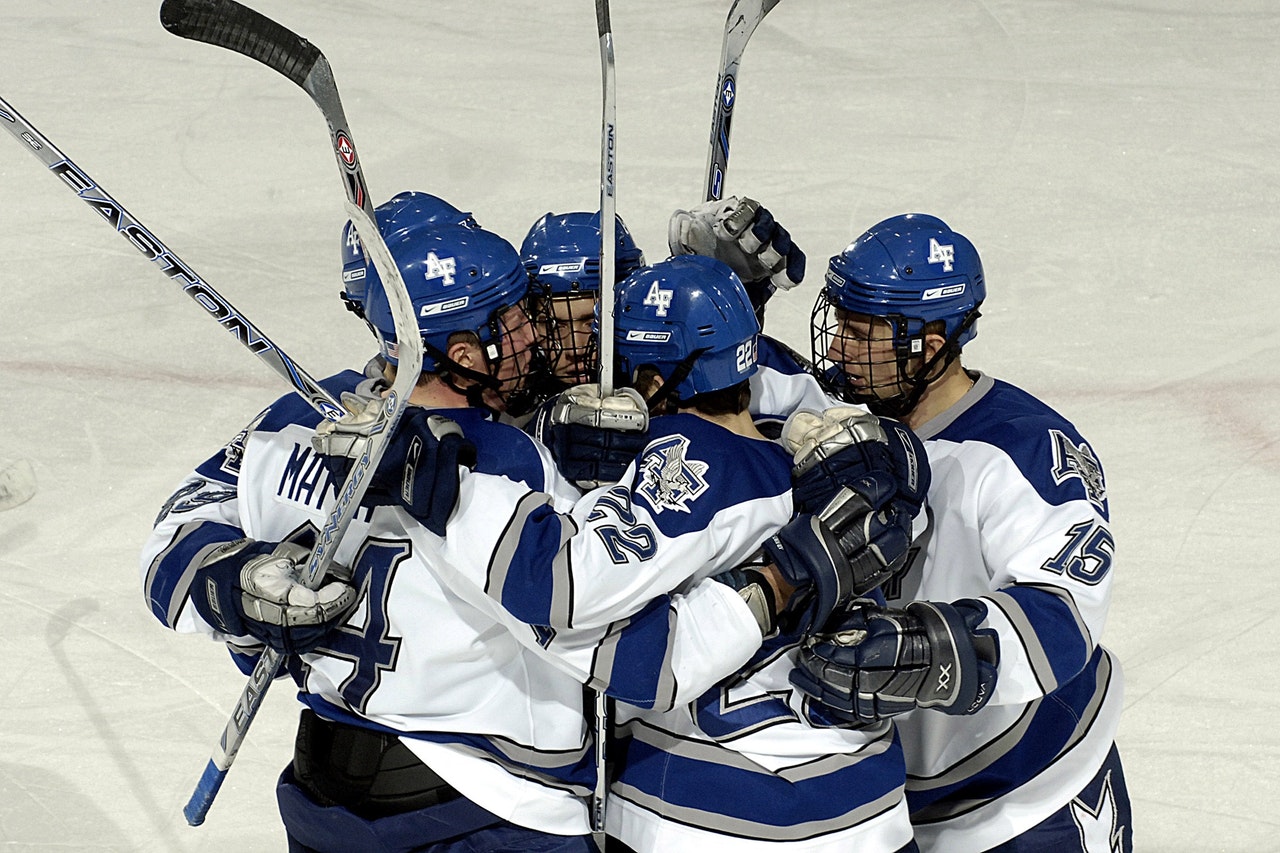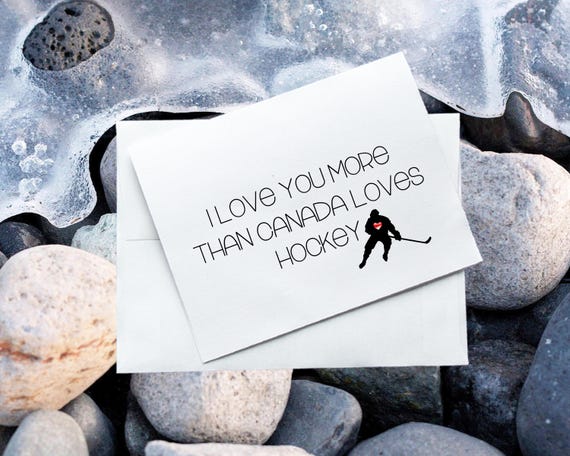Why Does Canada Love Hockey
Canada’s love of hockey partly stems from the fact that the great sport was (partly) created in this very country. Hockey is the national winter sport of Canada while lacrosse is the national summer sport. To give you an indication of how much Canadians love hockey, the Canada-US Men’s Gold Hockey Game at the Vancouver 2010 Olympics was the most watched television broadcast ever in Canadian history according to NHL.com. Hockey is not a sport I fell in love with because it was expected of me or because everyone else played. It is a sport I fell in love with because the moment I witnessed my first ice rink and stepped foot on the ice, I had no other choice. In fact, I was dismal in my first couple years but I never quit. Two hockey players at a rink TORONTO, Ont. – Canadians are more in love with hockey than ever. A new survey by MasterCard found 83 per cent of Canadians watch hockey every week. While the 570,000 players registered with Hockey Canada is an impressive number, it is down over 200,000 from its height in 2012. Unable to afford the exorbitant cost of our nation’s pastime and worried about the prevalence of head injuries, parents are pulling their children from hockey and redirecting them toward soccer and swimming.

Skip to:
Canada is the second largest country in the world (after Russia) by land mass.
Canada has a total area of 9.9 million sq. km. and touches the Pacific, Arctic, and Atlantic oceans (which is why its motto, “from sea to sea” is quite appropriate), making it the country with the longest coastline (243,791 km. long). It is composed of 10 provinces and three territories with Ottawa as its capital. The provinces are: Alberta (capital: Edmonton) , British Columbia (Victoria), Manitoba (Winnipeg), New Brunswick (Fredericton), Newfoundland and Labrador (St. John’s), Nova Scotia (Halifax), Ontario (Toronto), Prince Edward Island (Charlottetown), Quebec (Quebec City), and Saskatchewan (Regina). The three territories are: Northwest Territories (Yellowknife), Nunavut (Iqaluit), and Yukon (Whitehorse).
Land of Lakes
Canada has more lakes than the rest of the world combined. At last count, there may be as many as two million, with 563 lakes larger than 100 square kilometres. Canada’s largest include Lake Huron (Ontario), Great Bear Lake (Northwest Territories), and Lake Superior (Ontario). Lake Winnipeg, Canada’s fifth and the world’s 11th largest, is in Manitoba.
Multicultural population
Canada is the first country in the world to adopt a policy of multiculturalism, embracing diversity and pluralism. Today, according to the Parliament of Canada’s Canadian Multiculturalism report, the country is home to people from over 250 ethnic origins. Around 6.2 per cent of the total Canadian population reported an Aboriginal identity and 22.3 per cent belong to a visible minority (2016 Census). The largest groups among these visible minorities come from Asia (including the Middle East), Africa and Europe. The largest individual source of immigrants is the Philippines, followed by India and China (source: Statistics Canada).
Democracy/Monarchy
Canada is a Parliamentary Democracy headed by a Prime Minister. However, it is also a constitutional monarchy with executive authority vested in the Queen. This means that the Queen is the head of state, while the Prime Minister is the head of government. A parliamentary democracy has three parts: the Sovereign (Queen), the Senate, and the House of Commons. Meanwhile, the government has three levels: federal, provincial and municipal. The federal government is based in Ottawa and is headed by the Prime Minister. Provincial and territorial governments are headed by premiers, while municipal governments are led by mayors (Read Canada’s three levels of government to know more).
Canada means village
The country’s name is derived from “Kanata”, a Huron-Iroquois word meaning village or settlement. Two Indigenous youths used this word to describe the settlement of Stadacona (now Quebec City) to European explorer Jacques Cartier. Cartier then used “Canada” to describe a bigger area beyond Stadacona. The use of this name soon spread throughout the entire region, surpassing its former name, New France.
The maple leaf and other symbols
Did you know that it took 40 years for the Canadian parliament to finally decide on a Canadian flag? The red and white flag with the prominent maple leaf was officially launched on February 15, 1965 (making Feb. 15 National Flag of Canada Day) after much debate and rigorous study (read 5 amazing facts about the creation of the National Flag of Canada to know the full story). But have you ever wondered why the maple leaf is so identified with Canada? Well, for years even prior to the coming of European settlers, Indigenous Peoples have been using maple sap as a food staple. Throughout history, the image of the leaf found its way into Canadian coins, emblems and coats of arms. The maple tree is also very important to Canadians and is the official arboreal emblem. Today, Canada continues to produce three-quarters of the world’s maple syrup output.
Meanwhile, the beaver as a national emblem dates back to the 1700s, when the lucrative trade of beaver pelts (for fur hats) put Canada on the map. The Hudson’s Bay Company honoured the animal by putting it in its coat of arms. Another Canadian symbol is the Maple Leaf Tartan designed by David Weiser which became an official symbol in 2011.
Canada Day
Canada Day commemorates the signing of the British North America Act (today known as the Constitution Act, 1867) which created Canada. The statutory holiday is celebrated every July 1st, and was for a time, called Dominion Day. It marks the anniversary of the Confederation of three British colonies into four provinces: The United Province of Canada (Ontario and Quebec), New Brunswick, and Nova Scotia. To see how Canada Day is celebrated in various parts of the country, go to the official site.
“O Canada”
Canada’s national anthem, “O Canada” was composed by Calixa Lavallee with lyrics written by Sir Adolphe Basile-Routhier. Several versions have been made of the anthem, but the version used today was written by Robert Stanley Weir, a lawyer from Montreal. You can hear the anthem below (Youtube video by Canada Immigrant):
National dish: Poutine
Canada’s national dish originated from Quebec in the 1950s. Made up of a tasty mix of french fries, cheese curds and gravy, Poutine has been claimed by numerous people, but its inventor has never been confirmed. Anyway, canucks (a nickname for Canadians) have eaten the wonderful dish in more ways than one. Care for the traditional poutine? Or perhaps poutine with an international twist? How about going gourmet with foie gras poutine?
Inventions galore
What does basketball, the pacemaker, IMAX, and the Blackberry have in common? Yes, they were all invented by Canadians. Basketball was invented by Dr. James Naismith, a Canadian PE instructor in Massachusetts who wanted to create a game that can be played indoors during winter. Meanwhile, the first pacemaker was invented by electrical engineer John Hopps, and the IMAX (for Image Maximum) was created by Toronto-based Graeme Ferguson, Roman Kroitor, Robert Kerr and William Shaw. Lastly, the Blackberry cellphone is a product of Research in Motion (RIM), in Waterloo, Ontario. Want to know more Canadian inventions? Here are 19 things you might not know were invented in Canada.
National pastime
Hockey is the national winter sport of Canada while lacrosse is the national summer sport. To give you an indication of how much Canadians love hockey, the Canada-US Men’s Gold Hockey Game at the Vancouver 2010 Olympics was the most watched television broadcast ever in Canadian history according to NHL.com. Meanwhile, the women’s hockey team has also been dominating the Olympics, winning gold medals, the most recent of which was at the 2014 Sochi Olympic Winter Games.
Sources:Government of Canada site, canadafacts.org., Environment Canada, aboutnews,Canadian Heritage (at the Government of Canada site), montrealpoutine, Historica Canada, National Research Council of Canada, IMAX.com, and brighthub.com.
Quiz
11 Basic facts about Canada
Quiz Summary
Why Canadians Love Hockey
0 of 8 questions completed
Questions:
- 1
- 2
- 3
- 4
- 5
- 6
- 7
- 8
Information
You have already completed the quiz before. Hence you can not start it again.
You must sign in or sign up to start the quiz.
Results
Results
0 of 8 questions answered correctly

Your time:


Time has elapsed
You have reached 0 of 0 point(s), (0)
Earned Point(s): 0 of 0, (0)
0 Essay(s) Pending (Possible Point(s): 0)
- 1
- 2
- 3
- 4
- 5
- 6
- 7
- 8
- Answered
- Review
Why Does Canada Love Hockey Club
1. Question
Canada has the largest number of lakes in the world.
Incorrect- Question 2 of 8
2. Question
A fifth of the Canadian population are of Aboriginal ancestry.
Incorrect - Question 3 of 8
3. Question
Canada is both a constitutional monarchy and a parliamentary democracy.
Incorrect - Question 4 of 8
4. Question
Canada's parliament consists of the Senate and the House of Commons.
Incorrect - Question 5 of 8
5. Question
Incorrect - Question 6 of 8
6. Question
Incorrect - Question 7 of 8
7. Question
Incorrect - Question 8 of 8
8. Question
Incorrect
We'd love to hear from you!
Please login to tell us what you think.
Related Learning Activities
Voting in Municipal Elections in Manitoba

Why Does Canada Love Hockey Goalie
Voting in any election may seem a little confusing at times. Municipal elections are no exception. Attend this workshop to… Read more »
Voting in Federal Elections in Canada
Voting in Canada. Does the thought of this seem overwhelming or complicated? Join this workshop to learn how uncomplicated it… Read more »
Rights and responsibilities of Canadian residents and citizens
Attend this workshop to learn everything you need to know as a resident or citizen of Canada!